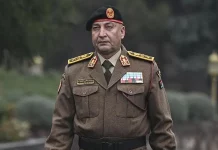-Pakistan slams Indian media for misreporting IAEA official’s remarks
-Says reports on BrahMos Missile incident disingenuous attempt to
absolve India of its irresponsible nuclear behaviour
By Our Diplomatic
Correspondent
ISLAMABAD: Pakistan on Wednesday asked India to explain illicit trafficking of nuclear objects and several repeated incidents of nuclear and radioactive material theft amid misleading reports in the Indian media regarding IAEA Chief’s comments.
Foreign Office deemed Indian media’s report a “disingenuous attempt” for misreporting Director General International Atomic Energy Agency (IAEA) Rafael Mariano Grossi’s response to a query about the firing of India’s missile being fired into Pakistan on March 9 this year.
The Indian media reported that the BrahMos nuclear capable missile fired into Pakistan’s territory from India was not a cause for any specific concern for the international nuclear watchdog.
The Foreign Office, in its statement, said that the report is a disingenuous attempt by the Indian state-sponsored media to absolve their country of its “irresponsible nuclear behaviour” by directing the question DG IAEA.
“The available transcripts show that DG IAEA responded in negative when asked whether the IAEA had sought information from the Indian government on the incident. It should have been qualified by stating that IAEA has no mandate on such matters,” the statement read.
Pakistan stated that the DG’s response cannot be “purposely misinterpreted” to “trivialise” the incident of a nuclear-capable BrahMos missile fire with grave implications for regional and global security. It added that the incident has raised several questions about India’s conduct as a nuclear state including, whether it was actually an accident.
“India also needs to answer questions about the underlying intentions, technical features and reliability of the missile system, safety, security and nuclear command and control protocols, and the presence of rogue elements in the Indian military,” the Foreign Office said in its statement.
Pakistan also demanded India to explain several repeated incidents of nuclear and radioactive material theft and illicit trafficking, which are more relevant to the IAEA mandate.
“It was expected to report these nuclear security related incidents under the IAEA Incidents and Trafficking Database,” the statement read. Pakistan said that the critical questions, which remain unanswered, should continue to be of concern to the international community.
Indian media outlet, The Indian Express, had claimed that the IAEA did not see the misfire of the missile as a cause of specific concern and that the matter did not raise questions on safety of nuclear material and weapon in India.
“Rafael Mariano Grossi, the director general of International Atomic Energy Agency, told The Indian Express in an interview at COP27 climate change meet that the incident was not viewed as a risk and there had been no consultation with the Indian government on this issue,” The Indian Express wrote in its news story on November 14.
According to the publication, Grossi said “no, we didn’t” when asked if the IAEA sought information about the incident from the Indian government. It added that the DG responded in negative to a question about doubts being raised on the safety of India’s nuclear assets.
After the incident was reported, the FO had summoned the Indian envoy to register a protest over the unprovoked violation of its airspace, saying such “irresponsible incidents” reflected the neighbouring country’s “disregard for air safety and callousness towards regional peace and stability”.
It also called for a thorough and transparent investigation of the incident, the results of which should be shared with Pakistan.
The Indian defence ministry had subsequently shared that the incident was “deeply regrettable” and attributed the “accidental firing” to a “technical malfunction”. Following India’s admission, Islamabad had questioned why New Delhi failed to immediately share information about the incident and acknowledged the occurrence only after Pakistan announced it, seeking clarification.
The FO had taken note of India accepting the missile accident, saying that the matter could not be addressed through the “simplistic explanation” by India and had listed a set of questions and issues in this regard, which it had said must be answered by the Indian authorities.
The United States had also later chimed in, saying that it had “no indication” that the missile launch was “anything other than an accident”.
The Indian Air Force said in August that the government had sacked three officers over the incident but the FO subsequently rejected India’s “purported closure” of the inquiry and reiterated the demand for a joint probe into the incident.




